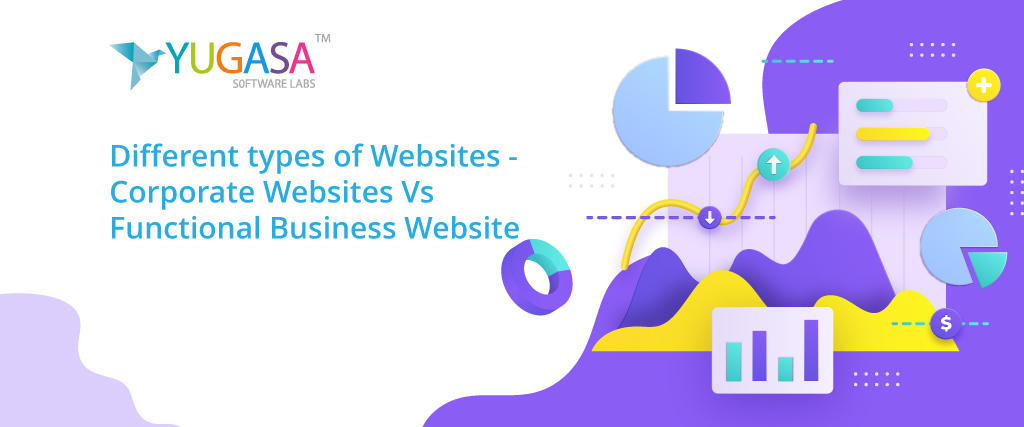Different kinds of websites: Corporate websites Vs. Functional Business Websites

Different kinds of websites: A website, living in the modern world, is crucial for any business. You typically miss out on prospects for your company if you have a business and don't have a website.
To help the company expand, a website can be used to achieve several distinct marketing strategies. The internet has a much wider scope than any other medium of advertisement.
The cornerstone of the online presence of your organization will be your website. On social networking sites, forums, and through pay-per-click advertisement programs, you can advertise your company across the internet.
Having an online presence plan and website enables you to promote your company online. Also essential is a website because it helps to build credibility as a business.
Websites typically have a map and directions to the shops or offices of the business for tourists to quickly locate their location.
Another crucial thing is that by constructing a website, you have the scope to represent your clients, why they should trust you, and the testimonials and evidence to back up those possibilities.
Now, you must be thinking about which kind of website is best for your business? To answer that question, let me take you through two basic types of websites.
Corporate Websites
In its most basic form, a corporate website provides professional information about an individual or a company and presents a showcase of their work, products, services, recognitions, testimonials, and many more!
Corporate websites are your digital impressions, your digital reputation. They tell the world things like:
- What you do?
- How you can help them?
- What is the reach and audience of your brand?
- What are your testimonials?
- Etc.
How do they help?
1. Build Brand Credibility
Every respectable organization has to have some sort of online presence in present times. Prospective customers would possibly mistrust any organization that did not have a phone number or a physical address, and it is possible to say the same about not having a website and email address.
These are valuable tools for exchanging important customer knowledge about your company and addressing all the what's and whys they may have.
Moreover, providing a high-quality, easy-to-use website helps consumers feel relaxed using your services since they can believe that in all aspects of your organization, they will expect the same positive experience.
2. 24*7 Online Presence
Getting a website implies that consumers will still reach you, whenever, everywhere. Your website helps to locate and secure new clients even outside of business hours.
This gives the consumer flexibility as they can access the data they need in the comfort of their own home, without any extra pressure to buy.
Plus, as most businesses now have their website, there is every possibility that by remaining offline you will lose clients to your competitors.
3. Supply of information - Different kinds of websites
A website offers a fast and easy way to exchange data between buyers and sellers at its simplest.
To encourage inquiries from prospective customers or reviews from existing ones, you can list your opening hours, contact details, show pictures of your location or goods, and use contact forms.
To involve your clients and market your company in an effective and cost-efficient way, you can also upload promotional videos.
This is also a good way to encourage and create a network with your clients on your social media platforms.
4. Advertisement Cost-Cutting
In addition to simply displaying data, you can also use your website to directly market products & services to customers, in some cases eliminating the need to use "brick-and-mortar" stores that require high running costs (staff wages, rental, utilities to name just a few).
It will also help you to lower your costs by eliminating these overheads, giving your company the real competitive advantage.
Inside your business, it can also be used internally; do you have any news you want to share with colleagues or have any valuable details that management can access?
Having an internal website will save you a lot of time since one place is all you need and can be accessed at any moment.
But what about engagement?
Well, that takes us to the second type of website.
Functional Websites
In the way, websites are designed today, the endless quest of web designers to use creativity and innovation has brought a radical shift.
The web development industry has seen amazing progress in the last decade. Designers are currently using sophisticated tools and methods to create functional websites that offer unique user experiences.
The secret to success is to give priority to useability. In reality, businesses that fail to understand the significance of the usability of their websites do not enhance their online reach.
Improved usability plays a key role in improving every website's efficiency and boosting sales. Only those websites that offer a smooth user interface are visited.
A login architecture engages the user to the brand. A newsletter reminds them of the value of your brand. And many more such features that outpower the corporate websites.
Some great examples of such websites are Facebook, Twitter, amazon, youtube, Instagram, etc.
As you can see, functional websites surpass the usage and informational bias and become an addiction for your users. It also builds a personalized marketing channel for you, that can take your sales to the sky.
So, if you also feel like having a responsive and functional business website, contact Yugasa! Our developers are experts in developing responsive designer websites to take your branding level to the next level.
Read More: 7+ DIFFERENT TYPES OF BEST WEBSITES YOU CAN MAKE WITH WORDPRESS
